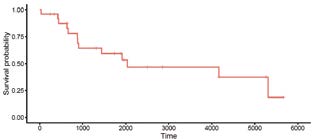Abstract
Introduction: The aim of this study was to evaluate the results of surgical treatment of intrahepatic cholangiocarcinoma (IHCHCA) in terms of overall survival and disease-free survival, and to analyse and find potential prognostic factors affecting overall survival and disease-free survival.
Methods: Retrospective evaluation was performed of consecutively enrolled patients operated for IHCHCA from January 2005 to January 2022 (17 years) had undergone surgery. During the monitored period, 38 surgical procedures were performed, of which liver resection was done in 25 cases (65.8%).
Results: The 5-year survival in the radically resected group was 44%, and the 5-year disease-free survival was 32%. Based on univariate and multivariate analysis, radicality of surgery (p=0.01116) and lymph node involvement (p=0.00576) were assessed as negative prognostic factors for overall survival. Radicality of surgery (p=0.018) and administration of adjuvant chemotherapy (p=0.044) were significant negative prognostic factors affecting disease-free survival. However, they lost their significance in the multivariate analysis.
Conclusion: Radical surgical resection of the liver remains an essential treatment option for intrahepatic cholangiocarcinoma aimed at achieving a radical procedure with microscopically negative margins

